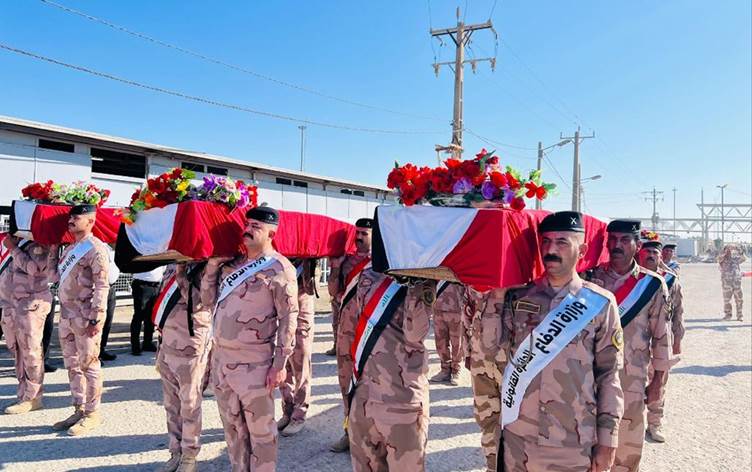
Ceremony in honor of the reception of the remains of 10 Iraqis who went missing in the Iran-Iraq war, on February 19, 2024. Photo: Iraqi defense ministry
ERBIL, Kurdistan Region - Iraq and Iran on Monday exchanged the remains of 45 individuals who had gone missing in the course of the eight-year-long war in the 1980s, the Iraqi defense ministry announced.
The Iraqi defense ministry’s human rights directorate conducted the exchange of the remains with the Iranian side in Basra province, under the supervision of the International Committee of the Red Cross (ICRC).
“The remains of 35 Iranians found within Iraqi territory during joint search operations in the Basra, Maysan, Wasit, and Diyala regions were handed over to the Iranian side. The remains of ten Iraqi martyrs were received in an official ceremony,” read a statement from the Iraqi defense ministry.
The remains belonged to individuals who had gone missing during the eight-year-long war which saw the two neighboring countries pitted against each other between 1980, the year following the birth of the Islamic Republic, and 1988. The war shaped the young theocracy and contributed to fueling antagonism against the US which supported former Iraqi dictator Saddam Hussein’s forces in the war.
The remains of the ten missing Iraqis will be sent to Baghdad’s forensics medicine department for further examination, said the ministry.
Iranian state media, IRNA, published images of Iran's reception of the missing nationals' remains from Iraq, on the same day. Family and tribe members of soldiers killed in the war attended the reception ceremony.
Tehran and Baghdad in 2008 signed an agreement under the ICRC auspices regarding the exchange of information and handing over remains of missing persons during the war. The remains of hundreds of soldiers have been returned since then.







Comments
Rudaw moderates all comments submitted on our website. We welcome comments which are relevant to the article and encourage further discussion about the issues that matter to you. We also welcome constructive criticism about Rudaw.
To be approved for publication, however, your comments must meet our community guidelines.
We will not tolerate the following: profanity, threats, personal attacks, vulgarity, abuse (such as sexism, racism, homophobia or xenophobia), or commercial or personal promotion.
Comments that do not meet our guidelines will be rejected. Comments are not edited – they are either approved or rejected.
Post a comment